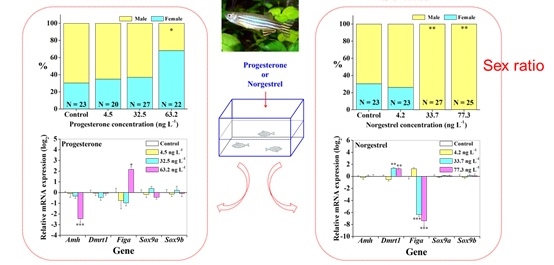
Natural progesterone and various synthetic progestins are widely used by humans and animals for various purposes, such as human contraception and therapy, animal breeding control and growth promotion. After natural excretion or administration of drugs, these progestogens will be released to the receiving environments. This may cause adverse effects on the organisms in aquatic environment.
The research team led by professor YING Guangguo conducted various investigations into contamination of progestogens in piggery environments, and found eleven progestogens including progesterone (P4) and its derivatives, and synthetic drugs such as dydrogesterone (DGT), medroxyprogesterone acetate (MPA), and norgestrel (NGT) with their concentrations up to 9330 ng/L in wastewater and 1350 ng/g dw in feces. In addition to their detection in animal wastewater and feces, they were also found in the receiving water and soil.
Laboratory toxicity testing with zebrafish showed that long-term exposure to environmentally relevant concentrations (<100 ng/L) of progesterone and norgestrel affects sex differentiation in zebrafish (Danio rerio). P4 and NGT were demonstrated to significantly induce more females and more males, respectively, which were accompanied with the regulation of the transcriptional levels of several genes (i.e., Amh, Dmrt1 and Figa) related to sex differentiation.
In addition, the balance of estrogens and androgens in fish might be altered following exposure to the two chemicals. Meanwhile, P4 and NGT could mainly mediate the transcriptional expression of steroidogenic genes. The modulating hormones and genes associated with steroid synthesis could contribute to disruption of sex differentiation in zebrafish.
In order to reduce these contaminants in animal wastewater, the research team also found the lagoon and digester systems were effective in the removal of progestagens, and should be promoted in developing countries with concentrated animal production. Moreover, biogas digesters and fish ponds should also be encouraged as they are low-cost and eco-friendly and at the same time with economic benefits from energy generated and fish produced.
The research results were published in international journals Water Research and Aquatic Toxicology. This research is supported by National Natural Science Foundation of China.

Long-term exposure to environmentally relevant concentrations of progesterone and norgestrel affects sex differentiation in Zebrafish (Danio rerio) (Image by YING Guangguo)

86-10-68597521 (day)
86-10-68597289 (night)

86-10-68511095 (day)
86-10-68512458 (night)

cas_en@cas.cn

52 Sanlihe Rd., Xicheng District,
Beijing, China (100864)

